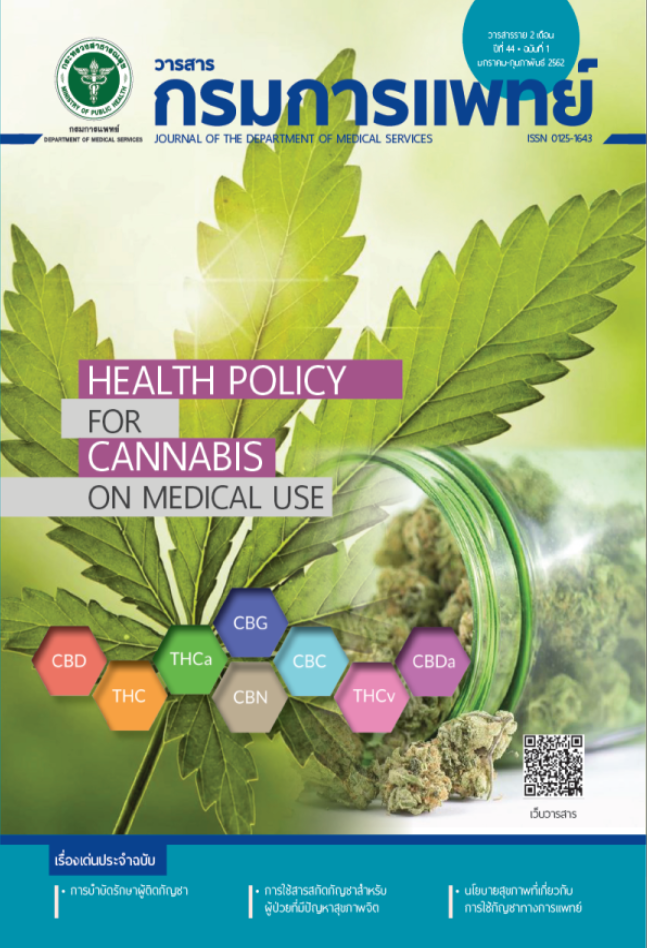Utilization of Amlodipine Drug in Hypertensive Patients Reduces Stroke Outcomes at Srithep Hospital, Petchabun Province
Keywords:
Amlodipine, Stroke, Calcium channel blockers, HypertensionAbstract
Background: Stroke is a major public health problem in hypertensive patients. This research aimed to study the effect of the use of Amlodipine on the occurrence of Stroke in hypertensive patients who were treated at Srithep hospital, Phetchaboon province. Method: This analytic research was case control study in hypertensive patients. The sample consisted of 121 cases of stroke and 484 cases of non-stroke hypertensive patients, that overall of subjects was 605 cases. Data were collected by studying the data from the medical records according to the criteria set during July to December 2018. Data were analyzed using statistics, percentage, mean, standard deviation, Chi-square test, Odd ratio (OR), 95%, CI and Multiple binary logistic. Significant level was indicated at 0.05. Results: The results revealed that patients with hypertension, stroke and non-stroke ratio was 1: 4. Comparison general characteristics between 2 groups including gender, age, smoking and alcohol consumption were not difference (p>0.05). Hypertensive drugs Treatment to control blood pressure founded that, the patients were treated with the most of ACE Inhibitor drug, followed by the Dyslipidemic drug and Calcium Channel blocker (Amlodipine), these were 49.6%, 36.4% and 33.7%, respectively. Interestingly, Amlodipine was factors related to stroke outcomes with 81.0% reducing the chance of stroke occur (Adj OR = 0.19, CI = 0.039-0.917, p = 0.039). While, ACE Inhibitor reduces the chance of stroke by 75.6 % (Adj OR = 0.244, CI = 0.066-0. 899, p = 0.034). Moreover, Anticoagulant drugs correlate with the occurrence of prevention of stroke by 100% (Adjusted OR = 0, CI = 0.0001-787.6, p = 0.002). However, Simvastatin was also associated with increasing the likelihood of stroke by 3155.8 time (Adj OR = 0.19, CI = 0.039-0.917, p = 0.039). Conclusion: Blood pressure control drugs in hypertensive patients that associated with reducing the likelihood of stroke outcomes were Amlodipine and ACE Inhibitor. This should therefore be consider to using for control blood pressure and also reducing the chance of stroke outcomes in hypertensive patients.
References
World health organization meeting on community control of Stroke and Hypertension. Control of stroke in the community: methodological considerations and protocol of WHO stroke register. CVD/s/73-6 Geneva: WHO; 2001.
Annual Report. Ministry of Public Health: Journal of the department of medical services. Thailand; 2016
ShizukiyoI , Kazuomi K, Tadao G, Naoki N, Yosikazu N, Akizumi T, et al. Continued High risk of stroke in treated hypertensive in general population: The jichi medical school cohort study ( JMS) 2008; 31: 1125 -33.
Roberta R, Joe F, Edoardo C. Primary stroke prevention and hypertension treatment which is the first-line strategy. Neurology international 2011; 2: e12.
Philip A. Prevention of stroke. The lancet. (Internet). 1998. (cited 2018 Aug 22). Available from: https://www. doi.org/ eid.htm.
Keun S. Blood Pressure management for stroke prevention and in acute stroke. National institutes of health Press 2017; 19: 152-65.
Fabio A, Paolo V, Gain P, Roberto G, Maurizio B, Jan A,et al. Calcium channel blockade to prevent stroke in hypertension. American journal of hypertension 2004; 17: 817-22.
Chang G, Is Amlodipine more cardio protective than other hypertensive drug classes. National institutes of health Press 2014; 29: 310-04.
Balligand JL, god friend T. Amlodipine and stroke prevention. Hypertension 2007; 50: 71-2.
Warlow CJ, Gijn VM, Wardlaw DJ, Bamford G, Hankey P. Stroke Practical Management. 2008; 3: 76-204.
Paolo. Angiotensin-Converting Enzyme Inhibitors and Calcium Channel Blockers for Coronary Heart Disease and Stroke Prevention 2005; 35: 290-340.
Wang JG, Li Y, Franklin SS, Safar M. Prevention of stroke and myocardial infarction by Amlodipine and angiotensin receptor blockers. A quantitative overview. Hypertension 2007; 50: 181–8.
Strauss MH, Hall AS. Do angiotensin receptor blockers increase the risk of myocardial infarction? Circulation. 2006; 114: 838–54.
Verdecchia P, Angeli F, Gattobigio R, Reboldi GP. Do angiotensin II receptor blockers increase the risk of myocardial infarction. Eur Heart J 2005; 26: 2381–6.
Downloads
Published
How to Cite
Issue
Section
License
บทความที่ได้รับการตีพิมพ์เป็นลิขสิทธิ์ของกรมการแพทย์ กระทรวงสาธารณสุข
ข้อความและข้อคิดเห็นต่างๆ เป็นของผู้เขียนบทความ ไม่ใช่ความเห็นของกองบรรณาธิการหรือของวารสารกรมการแพทย์



